8 feb 2018

Economic experts believe that the Palestinian budget and its government finances will most likely not be affected by United States’ cut in aid to Palestine, because the aid was not intended for the treasury, but rather for various projects carried out by non-governmental organizations (NGOs) and implemented through American agencies operating in Palestine.
They downplayed, according to WAFA, the impact of the US decision on the donor countries that provide assistance to the Palestinian people, calling for the need to work on the diplomatic and political level with these countries in order for them to continue to provide financial assistance.
According to data from the Palestinian Finance Ministry, US support for the Palestinian budget has dropped in the past five years to reach $75 million by the end of October of last year.
According to statistics, total aid to the Palestinian people since the establishment of the Palestinian Authority (PA) in 1994 has so far reached about $37 billion, equivalent to an average of $1.5 billion a year. However, aid has fallen in the last two years to between $600 million and $700 million, including US aid.
US aid to the Palestinians is divided into two parts; the first part is provided by Washington to the United Nations Relief and Works Agency (UNRWA) to provide services to Palestinian refugees to cover expenses and employees’ salaries, and the second part is provided through the US Agency for International Development (USAID) for its projects in various sectors in the West Bank and Gaza Strip, while the United States does not provide any direct aid or funding to the Palestinian government.
The budget for the current year is $4.4 billion. The budget relies on three sources of revenues to finance its expenses. The first is local taxes of various types, mainly income tax, value added tax and property tax, which constitute about 25% of total revenues and estimated at $1.1 billion dollars annually.
The second source of funding for the budget is the clearing revenues, which are the taxes on imported goods that Israel transfers monthly to the Palestinian government in accordance with the Paris Economic Protocol signed in 1994. Its monetary revenues account for 50% of the total revenues, which amounts to $2.5 billion annually. The third source of funding for the budget is foreign aid, which constitutes about 25% of the budget funding with a total value estimated at $1.2 billion.
Mohammed Shtayyeh, head of the Palestinian Economic Council for Development and Reconstruction (PECDAR), said annual US aid to the Palestinians amounts to $500 million.
“Washington does not provide direct funding to the treasury of the Palestinian Authority,” he said, downplaying the impact of the US decision to cut aid on the PA.
“The Palestinian leadership does not trade national rights for money and does not accept political blackmail,” he said, noting that “since 1994, direct US assistance to the PA was done only two or three times, while the amount of projects financed annually is around $50 to $60 million.”
He explained that in 2016, for example, the United States provided about $390 million to UNRWA, $70 million to the PA, and the rest for the NGOs. In some years, such as 2015, the US did not offer a single penny for the budget.
The basic aid provided to the Palestinian people is the amount provided to UNRWA and not to the PA, said Shtayyeh, which was not affected by the slash in aid while UNRWA was greatly affected.
“This week, the Netherlands, Belgium and Kuwait have offered to help UNRWA, and we are working to urge the international community to compensate UNRWA for the lack in aid,” he said.
Economic expert Nasr Abdul Karim said Palestine cannot give up foreign aid, which amounts to $700 million annually. It will be difficult to make this amount available from any other source, including taxes. It is easier, however, to do away with US aid because only a small portion goes for the budget while the rest for development projects and therefore it is possible to postpone these projects.
He said US aid was not regular in the last 5 to 6 years as a result of political factors during which pressure is applied on the Palestinians to make concessions.
Abdul Karim said that about $50 million or $60 million dollars of the US aid goes to the treasury and finances the budget deficit while the rest is spent through projects and contracts with US agencies working in the Palestinian territories to finance infrastructure projects and for capacity building as well as for technical support and development of the security services.
He added that US aid does not go for the budget, and therefore doing without this aid is possible and does not have impact on the budget and is not the decisive factor in the financial stability of the PA. US President Donald Trump understands that his country’s aid to Palestine, although important but not essential for the life of the Palestinian government, and realizes that the Palestinian government can live without it.
He explained that Trump knows that Israel can stop the money from the Palestinian government but it cannot bear the consequences of the collapse of the PA and therefore preserves the thin thread in the economic relationship with the Palestinians in order to maintain the economic cycle in Palestine.
Economist Samir Abdullah said US assistance to the Palestinian people was greatly reduced since 2013 following the PA’s application for full United Nations membership, first at the Security Council and then at the General Assembly. The aid was mainly for projects implemented by the USAID, which came in two parts, one for infrastructure and the second for projects to facilitate trade. These projects were not very useful because the Israelis were not cooperative in their implementation therefore reducing the worthiness of all American studies and recommendations.
He added that impact of the aid was not visible over the past years and will not affect the Palestinian government in the future. It will cause problems to UNRWA, which will force it to reduce its important services provided to the Palestinian refugees.
They downplayed, according to WAFA, the impact of the US decision on the donor countries that provide assistance to the Palestinian people, calling for the need to work on the diplomatic and political level with these countries in order for them to continue to provide financial assistance.
According to data from the Palestinian Finance Ministry, US support for the Palestinian budget has dropped in the past five years to reach $75 million by the end of October of last year.
According to statistics, total aid to the Palestinian people since the establishment of the Palestinian Authority (PA) in 1994 has so far reached about $37 billion, equivalent to an average of $1.5 billion a year. However, aid has fallen in the last two years to between $600 million and $700 million, including US aid.
US aid to the Palestinians is divided into two parts; the first part is provided by Washington to the United Nations Relief and Works Agency (UNRWA) to provide services to Palestinian refugees to cover expenses and employees’ salaries, and the second part is provided through the US Agency for International Development (USAID) for its projects in various sectors in the West Bank and Gaza Strip, while the United States does not provide any direct aid or funding to the Palestinian government.
The budget for the current year is $4.4 billion. The budget relies on three sources of revenues to finance its expenses. The first is local taxes of various types, mainly income tax, value added tax and property tax, which constitute about 25% of total revenues and estimated at $1.1 billion dollars annually.
The second source of funding for the budget is the clearing revenues, which are the taxes on imported goods that Israel transfers monthly to the Palestinian government in accordance with the Paris Economic Protocol signed in 1994. Its monetary revenues account for 50% of the total revenues, which amounts to $2.5 billion annually. The third source of funding for the budget is foreign aid, which constitutes about 25% of the budget funding with a total value estimated at $1.2 billion.
Mohammed Shtayyeh, head of the Palestinian Economic Council for Development and Reconstruction (PECDAR), said annual US aid to the Palestinians amounts to $500 million.
“Washington does not provide direct funding to the treasury of the Palestinian Authority,” he said, downplaying the impact of the US decision to cut aid on the PA.
“The Palestinian leadership does not trade national rights for money and does not accept political blackmail,” he said, noting that “since 1994, direct US assistance to the PA was done only two or three times, while the amount of projects financed annually is around $50 to $60 million.”
He explained that in 2016, for example, the United States provided about $390 million to UNRWA, $70 million to the PA, and the rest for the NGOs. In some years, such as 2015, the US did not offer a single penny for the budget.
The basic aid provided to the Palestinian people is the amount provided to UNRWA and not to the PA, said Shtayyeh, which was not affected by the slash in aid while UNRWA was greatly affected.
“This week, the Netherlands, Belgium and Kuwait have offered to help UNRWA, and we are working to urge the international community to compensate UNRWA for the lack in aid,” he said.
Economic expert Nasr Abdul Karim said Palestine cannot give up foreign aid, which amounts to $700 million annually. It will be difficult to make this amount available from any other source, including taxes. It is easier, however, to do away with US aid because only a small portion goes for the budget while the rest for development projects and therefore it is possible to postpone these projects.
He said US aid was not regular in the last 5 to 6 years as a result of political factors during which pressure is applied on the Palestinians to make concessions.
Abdul Karim said that about $50 million or $60 million dollars of the US aid goes to the treasury and finances the budget deficit while the rest is spent through projects and contracts with US agencies working in the Palestinian territories to finance infrastructure projects and for capacity building as well as for technical support and development of the security services.
He added that US aid does not go for the budget, and therefore doing without this aid is possible and does not have impact on the budget and is not the decisive factor in the financial stability of the PA. US President Donald Trump understands that his country’s aid to Palestine, although important but not essential for the life of the Palestinian government, and realizes that the Palestinian government can live without it.
He explained that Trump knows that Israel can stop the money from the Palestinian government but it cannot bear the consequences of the collapse of the PA and therefore preserves the thin thread in the economic relationship with the Palestinians in order to maintain the economic cycle in Palestine.
Economist Samir Abdullah said US assistance to the Palestinian people was greatly reduced since 2013 following the PA’s application for full United Nations membership, first at the Security Council and then at the General Assembly. The aid was mainly for projects implemented by the USAID, which came in two parts, one for infrastructure and the second for projects to facilitate trade. These projects were not very useful because the Israelis were not cooperative in their implementation therefore reducing the worthiness of all American studies and recommendations.
He added that impact of the aid was not visible over the past years and will not affect the Palestinian government in the future. It will cause problems to UNRWA, which will force it to reduce its important services provided to the Palestinian refugees.
7 feb 2018
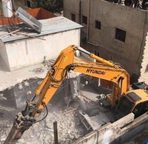
On Wednesday morning, Israeli tanks withdrew from Palestinian agricultural lands, in the al-Farisiyya area, in the Northern Pains of the occupied West Bank, after invading them and using them for live fire training, causing excessive damage, and devastating the farmers.
The head of the Agricultural Department in the West Bank, Engineer Majdi Odah, said the tanks invaded eight dunams, planted with Hummus, and conducted live fire training, causing nearly %100 damage to the lands, and their produce.
“This time of the year, the losses of the Palestinian farmers are at least 1500 Israeli Shekel per Dunam,” he said, “Two years ago, the army carried out one of the largest military drills in the same area, causing very serious losses to the farmers.”
Al-Farisiyya area is one of the dozens of Palestinian communities, in the West Bank’s northern plains, where Israel is denying the Palestinians basic infrastructure.
The Palestinians fear that the army would continue to use their lands for training, especially since the soldiers conduct frequent drills on their lands, and repeatedly displace the residents.
Ziad Sawafta, the owner of the lands targeted in this invasion, said that he planted his 22 dunams with Hummus, but the soldiers chose to conduct their training in eight dunams, in the center of his lands, therefore, destroying them all.
“The soldiers also destroyed 150 meters of irrigation pipes,” he said, “Without the water, we have nothing; we have been planning the lands for so many years.”
It is worth mentioning that the soldiers used artillery and tank shells, in addition to live fire, close to many tents and dwellings for local shepherds and farmers.
The Palestinians in that area depend on agriculture and their livestock as their only sources of livelihood, while the army repeatedly invades the lands and conducts its training.
The area is known for fertile lands, and rich in water resources, but Israel deeps stealing the lands from the Palestinians, and uses them for military purposes, and for the illegal construction and expansion of its colonies.
Last month, the soldiers shot a Palestinian child with a live round in the head, during “military training” near Tubas, in northeastern West Bank.
The head of the Agricultural Department in the West Bank, Engineer Majdi Odah, said the tanks invaded eight dunams, planted with Hummus, and conducted live fire training, causing nearly %100 damage to the lands, and their produce.
“This time of the year, the losses of the Palestinian farmers are at least 1500 Israeli Shekel per Dunam,” he said, “Two years ago, the army carried out one of the largest military drills in the same area, causing very serious losses to the farmers.”
Al-Farisiyya area is one of the dozens of Palestinian communities, in the West Bank’s northern plains, where Israel is denying the Palestinians basic infrastructure.
The Palestinians fear that the army would continue to use their lands for training, especially since the soldiers conduct frequent drills on their lands, and repeatedly displace the residents.
Ziad Sawafta, the owner of the lands targeted in this invasion, said that he planted his 22 dunams with Hummus, but the soldiers chose to conduct their training in eight dunams, in the center of his lands, therefore, destroying them all.
“The soldiers also destroyed 150 meters of irrigation pipes,” he said, “Without the water, we have nothing; we have been planning the lands for so many years.”
It is worth mentioning that the soldiers used artillery and tank shells, in addition to live fire, close to many tents and dwellings for local shepherds and farmers.
The Palestinians in that area depend on agriculture and their livestock as their only sources of livelihood, while the army repeatedly invades the lands and conducts its training.
The area is known for fertile lands, and rich in water resources, but Israel deeps stealing the lands from the Palestinians, and uses them for military purposes, and for the illegal construction and expansion of its colonies.
Last month, the soldiers shot a Palestinian child with a live round in the head, during “military training” near Tubas, in northeastern West Bank.
5 feb 2018
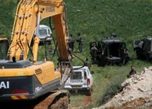
Israeli bulldozers destroyed water lines supplying tens of acres of land in the northern Jordan Valley, on Monday morning.
Local activist Aref Daraghmeh told Ma’an News Agency that Israeli bulldozers destroyed a water pipeline belonging to a Palestinian identified as Bassem Faqha.
The line feeds some 150 dunams (37 acres) of land planted with watermelons.
The Jordan Valley forms a third of the occupied West Bank, with 88 percent of its land classified as Area C — under full Israeli military control.
Demolitions of Palestinian infrastructure and residences occur frequently in Area C, with the Jordan Valley’s Bedouin and herding communities being particularly vulnerable to such policies.
Israeli forces confiscated cattle and water tanks, as well as agricultural machinery from Bedouin Palestinians in the so-called firing zone in September of last year.
Local activist Aref Daraghmeh told Ma’an News Agency that Israeli bulldozers destroyed a water pipeline belonging to a Palestinian identified as Bassem Faqha.
The line feeds some 150 dunams (37 acres) of land planted with watermelons.
The Jordan Valley forms a third of the occupied West Bank, with 88 percent of its land classified as Area C — under full Israeli military control.
Demolitions of Palestinian infrastructure and residences occur frequently in Area C, with the Jordan Valley’s Bedouin and herding communities being particularly vulnerable to such policies.
Israeli forces confiscated cattle and water tanks, as well as agricultural machinery from Bedouin Palestinians in the so-called firing zone in September of last year.
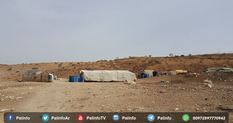
Israeli Occupation Forces (IOF) on Monday seized tents and structures belonging to one of the Palestinian residents in Khirbet Um al-Jamal, in the northern Jordan Valley.
Motaz Bsharat, who monitors developments in the Jordan Valley, said that IOF soldiers seized tents and structures, including chicken coops, belonging to a local resident who was identified as Suliman Ka’abneh.
Motaz Bsharat, who monitors developments in the Jordan Valley, said that IOF soldiers seized tents and structures, including chicken coops, belonging to a local resident who was identified as Suliman Ka’abneh.
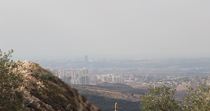
The Israeli Occupation Forces (IOF) prevented on Monday a group of Palestinian farmers from entering their olive groves located behind the Apartheid Wall.
The farmers, from Salfit, were stopped by Israelis forces on their way to work in their farm lands, located on the Israeli side of the separation wall, which runs through the farmers’ lands.
Palestinians living in the areas where Israel’s separation wall cut off their lands, are required to obtain entry permits, and cannot enter their lands for any purpose other than work or residence.
However, Israeli military gates are often closed, denying the farmers’ access to their agricultural lands.
During the olive harvest season -- an essential time of year for Palestinian farmers whose main source of income is often olive farming -- Palestinians are regularly turned around by Israeli forces, attacked by settlers, or only given a few days to harvest hundreds of olive trees.
Since the beginning of olive harvest season -- a longheld Palestinian tradition and way of life for many farmers -- several incidents of settlers attacking Palestinians while picking their olives have been reported.
The farmers, from Salfit, were stopped by Israelis forces on their way to work in their farm lands, located on the Israeli side of the separation wall, which runs through the farmers’ lands.
Palestinians living in the areas where Israel’s separation wall cut off their lands, are required to obtain entry permits, and cannot enter their lands for any purpose other than work or residence.
However, Israeli military gates are often closed, denying the farmers’ access to their agricultural lands.
During the olive harvest season -- an essential time of year for Palestinian farmers whose main source of income is often olive farming -- Palestinians are regularly turned around by Israeli forces, attacked by settlers, or only given a few days to harvest hundreds of olive trees.
Since the beginning of olive harvest season -- a longheld Palestinian tradition and way of life for many farmers -- several incidents of settlers attacking Palestinians while picking their olives have been reported.
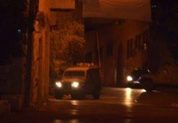
Gaza's Ministry of Health on Monday morning announced that backup generators at three additional health centers in Gaza have stopped working due to the acute fuel shortage.
Spokesman for the Ministry, Ashraf al-Qedra, said that the number of health facilities whose services have been suspended due to the fuel crisis has reached 3 hospitals and 13 medical centers so far.
Al-Qedra expressed deep concern that more generators might stop working at other centers in view of the absence of any solution to the crisis, which would result in serious repercussions on the future of Gaza's health sector.
Al-Qedra said in an earlier statement that the Crisis Management Committee at the Ministry of Health stressed that the health situation in the Gaza Strip has entered an unprecedented stage.
The Committee called on donors to immediately intervene to put an end to the fuel crisis and asked the Gaza Electricity Distribution Company to work urgently to give priority to hospitals and provide them with electricity around the clock.
Al-Qedra explained that health services in Gaza are in constant decline especially after services were halted in Beit Hanoun hospital and al-Durra children's hospital and patients were transferred to other hospitals.
Spokesman for the Ministry, Ashraf al-Qedra, said that the number of health facilities whose services have been suspended due to the fuel crisis has reached 3 hospitals and 13 medical centers so far.
Al-Qedra expressed deep concern that more generators might stop working at other centers in view of the absence of any solution to the crisis, which would result in serious repercussions on the future of Gaza's health sector.
Al-Qedra said in an earlier statement that the Crisis Management Committee at the Ministry of Health stressed that the health situation in the Gaza Strip has entered an unprecedented stage.
The Committee called on donors to immediately intervene to put an end to the fuel crisis and asked the Gaza Electricity Distribution Company to work urgently to give priority to hospitals and provide them with electricity around the clock.
Al-Qedra explained that health services in Gaza are in constant decline especially after services were halted in Beit Hanoun hospital and al-Durra children's hospital and patients were transferred to other hospitals.
4 feb 2018
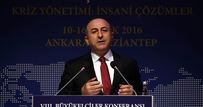
Turkey has pledged 10 million dollars to the Palestinian government to support important projects in the Gaza Strip and the occupied territories.
This came in an agreement signed on Saturday between Palestinian minister of foreign affairs Riyad Maliki and his Turkish counterpart, Mevlut Cavusoglu, in the city of Antalya.
Under the agreement, Turkey will initially channel 3.5 million dollars to the Palestinian government to fund the most urgent projects in Palestine, especially in Gaza.
During a meeting, the two sides also explored the mechanisms for the implementation of the resolutions issued by the emergency summit of the Organization of Islamic Cooperation last December 2017 to confront the US recognition of Occupied Jerusalem as Israel’s capital.
This came in an agreement signed on Saturday between Palestinian minister of foreign affairs Riyad Maliki and his Turkish counterpart, Mevlut Cavusoglu, in the city of Antalya.
Under the agreement, Turkey will initially channel 3.5 million dollars to the Palestinian government to fund the most urgent projects in Palestine, especially in Gaza.
During a meeting, the two sides also explored the mechanisms for the implementation of the resolutions issued by the emergency summit of the Organization of Islamic Cooperation last December 2017 to confront the US recognition of Occupied Jerusalem as Israel’s capital.
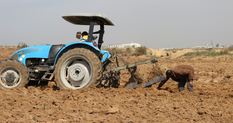
The European Union (EU) has made its contribution to the Palestinian Authority (PA) to support Palestinian farmers and agricultural businesses in the West Bank. Nearly €317,000 was channeled to the PA program "Assistance to Agriculture in the West Bank".
The EU said in a press statement on Saturday that the eligible beneficiaries are farmers and agricultural facilities in the West Bank directly affected by the Israeli occupation, particularly farmers in Area B and C.
It explained that this support will help the farmers to restart, repair or replace their damaged businesses through different activities including acquisition of agricultural supplies, rehabilitation of land and other small infrastructure works.
Through this program, the EU supports 42 farmers in Nablus and Salfit provinces. The total number of farmers benefiting from the program is 61 in the West Bank.
The EU said in a press statement on Saturday that the eligible beneficiaries are farmers and agricultural facilities in the West Bank directly affected by the Israeli occupation, particularly farmers in Area B and C.
It explained that this support will help the farmers to restart, repair or replace their damaged businesses through different activities including acquisition of agricultural supplies, rehabilitation of land and other small infrastructure works.
Through this program, the EU supports 42 farmers in Nablus and Salfit provinces. The total number of farmers benefiting from the program is 61 in the West Bank.
3 feb 2018
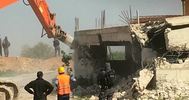
Minister for Foreign Trade and Development Cooperation of the Netherlands, Sigrid Kaag, has been subjected to a fierce campaign for donating 13 million euros to UNRWA.
Head of the Palestinian House in the Netherlands Amin Abu Rashid expressed gratitude to the Dutch Minister for her support to the Palestinian cause over the US President’s decision to reduce his country financial aids to UNRWA.
In this regard, Abu Rashid called for more support to the Palestinian people and their legitimate rights.
Head of the Palestinian House in the Netherlands Amin Abu Rashid expressed gratitude to the Dutch Minister for her support to the Palestinian cause over the US President’s decision to reduce his country financial aids to UNRWA.
In this regard, Abu Rashid called for more support to the Palestinian people and their legitimate rights.
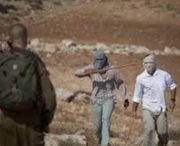
A group of extremist Israeli colonists attacked, Saturday, many Palestinian farmers on their own lands in Beit Ummar town, north of Hebron, in the southern part of the occupied West Bank.
The WAFA Palestinian News Agency has reported that the assailants, including a security guard of Karmie Tzur illegal colony, which was built on private Palestinian lands, hurled stones at the farmers, while shouting and cussing at them.
The attackers forced the Palestinians out of their lands, and threatened to kill them, while Israeli soldiers stood nearby without intervening.
Among the Palestinians who were attacked by the colonists was Ibrahim Sabarna, and his family.
The WAFA Palestinian News Agency has reported that the assailants, including a security guard of Karmie Tzur illegal colony, which was built on private Palestinian lands, hurled stones at the farmers, while shouting and cussing at them.
The attackers forced the Palestinians out of their lands, and threatened to kill them, while Israeli soldiers stood nearby without intervening.
Among the Palestinians who were attacked by the colonists was Ibrahim Sabarna, and his family.
2 feb 2018
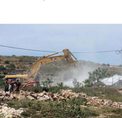
An Israeli court ordered, Thursday, the demolition of seven Palestinian residential buildings in Susiya village, south of Hebron, in the southern part of the occupied West Bank.
The court was looking into petitions filed by Palestinians living in the targeted homes, and said that the “Civil Administration Office,” which is run by the military in the occupied West Bank, has the green light to demolish seven homes, inhabited by 42 Palestinians, half of them are children, and some of the older residents suffer from chronic conditions.
The army also wanted to demolish the local clinic, but the court decided to delay the issue until the end of this July, to give the residents some time to find an alternate clinic.
The military was demanding the demolition of twenty buildings, but the court approved the destruction of seven.
The court said that “the army must consider humanitarian issues when enforcing construction and planning laws,” in the occupied West Bank.
The remaining buildings are subject to further deliberations, and are still threatened with demolition, pending a court ruling in appeals, which include construction plans presented by the villagers.
The court will be looking into these maps and plans on July 5th, 2018, but the army is unilaterally planning to demolish them.
The villagers face the constant threat of losing their homes in Susiya, while the military already demolished many homes and structures, in addition to the local mosque, especially since Israel is trying to relocate them to a different area, to build and expand its illegal colonies, in direct violation of International Humanitarian Law.
The court was looking into petitions filed by Palestinians living in the targeted homes, and said that the “Civil Administration Office,” which is run by the military in the occupied West Bank, has the green light to demolish seven homes, inhabited by 42 Palestinians, half of them are children, and some of the older residents suffer from chronic conditions.
The army also wanted to demolish the local clinic, but the court decided to delay the issue until the end of this July, to give the residents some time to find an alternate clinic.
The military was demanding the demolition of twenty buildings, but the court approved the destruction of seven.
The court said that “the army must consider humanitarian issues when enforcing construction and planning laws,” in the occupied West Bank.
The remaining buildings are subject to further deliberations, and are still threatened with demolition, pending a court ruling in appeals, which include construction plans presented by the villagers.
The court will be looking into these maps and plans on July 5th, 2018, but the army is unilaterally planning to demolish them.
The villagers face the constant threat of losing their homes in Susiya, while the military already demolished many homes and structures, in addition to the local mosque, especially since Israel is trying to relocate them to a different area, to build and expand its illegal colonies, in direct violation of International Humanitarian Law.
31 jan 2018

Ahead of the Emergency Donor Meeting in Brussels, today, the meeting’s conveners Federica Mogherini, High Representative for Foreign Affairs, and Norwegian Foreign Minister Ine Marie Eriksen Søreide met with members of the press to highlight their key objectives for the meeting.
The principle objectives ahead of the meeting, which was called under ‘extraordinary’ circumstance and held behind closed doors, were to demonstrate the European Union’s commitment to increase its role in the region and the need to settle the crisis in Gaza.
According to the PNN, Norwegian Foreign Minister Søreide called on ‘the need for a comprehensive plan for the resumption of PA control in Gaza’; while her counterpart in the EU, High Representative Mogherini, regarded the issue in Gaza as being ‘directly linked to the security situation in the entire region and to our common fight against terrorism.’
‘The daily life of citizens has been very difficult for too long,’ High Representative Mogherini said, ‘despite large international humanitarian help including by the European Union’.
High Representative Mogherini reaffirmed the EU’s commitment to targeted political and financial action through increased financial and structural support and enhanced engagement with regional leaders.
High Representative Mogherini announced the adoption of ‘a new package of 42.5 million Euros’ during her press conference, which includes ‘activities in East Jerusalem and support to the building of a democratic and accountable Palestinian state through targeted policy reforms, fiscal consolidation, reforming business, and strengthening of Palestinian civil society’.
Further engagement with the European Union would include future meetings between foreign minister of the Union’s member states and their counterparts among of regional leaders and the Arab League.
The principle objectives ahead of the meeting, which was called under ‘extraordinary’ circumstance and held behind closed doors, were to demonstrate the European Union’s commitment to increase its role in the region and the need to settle the crisis in Gaza.
According to the PNN, Norwegian Foreign Minister Søreide called on ‘the need for a comprehensive plan for the resumption of PA control in Gaza’; while her counterpart in the EU, High Representative Mogherini, regarded the issue in Gaza as being ‘directly linked to the security situation in the entire region and to our common fight against terrorism.’
‘The daily life of citizens has been very difficult for too long,’ High Representative Mogherini said, ‘despite large international humanitarian help including by the European Union’.
High Representative Mogherini reaffirmed the EU’s commitment to targeted political and financial action through increased financial and structural support and enhanced engagement with regional leaders.
High Representative Mogherini announced the adoption of ‘a new package of 42.5 million Euros’ during her press conference, which includes ‘activities in East Jerusalem and support to the building of a democratic and accountable Palestinian state through targeted policy reforms, fiscal consolidation, reforming business, and strengthening of Palestinian civil society’.
Further engagement with the European Union would include future meetings between foreign minister of the Union’s member states and their counterparts among of regional leaders and the Arab League.

The Palestinian Businessmen Association in Gaza on Wednesday called on the European Union (EU) to immediately intervene to save Gaza's economy form an imminent collapse.
Chairman of the Association, Ali al-Hayek, during a meeting handed the director of the EU office in Gaza, Ayman Fteiha, a letter in which businessmen in Gaza ask the EU to intervene to save Gaza's economy which is on the verge of collapse in view of the tightened blockade and the absence of any solutions.
The Association called for urgent assistance to the private sector, which provides 70% of job opportunities in Gaza, especially in light of the extremely high unemployment rate.
The Coordination Council for Private Sector Institutions called for lifting the restrictions imposed on the Gaza reconstruction operation which led to the suspension of many construction projects and robbed more than 70,000 Gazan workers of their jobs.
The Council stressed the need to pressure the US to reverse its latest decisions to withhold aid to UNRWA and limit its activities, particularly in the Gaza Strip.
Lifting the blockade and achieving Palestinian reconciliation, according to the Coordination Council for Private Sector Institutions, should be among the first steps taken to alleviate the suffering of the Palestinian people in Gaza at all levels.
Chairman of the Association, Ali al-Hayek, during a meeting handed the director of the EU office in Gaza, Ayman Fteiha, a letter in which businessmen in Gaza ask the EU to intervene to save Gaza's economy which is on the verge of collapse in view of the tightened blockade and the absence of any solutions.
The Association called for urgent assistance to the private sector, which provides 70% of job opportunities in Gaza, especially in light of the extremely high unemployment rate.
The Coordination Council for Private Sector Institutions called for lifting the restrictions imposed on the Gaza reconstruction operation which led to the suspension of many construction projects and robbed more than 70,000 Gazan workers of their jobs.
The Council stressed the need to pressure the US to reverse its latest decisions to withhold aid to UNRWA and limit its activities, particularly in the Gaza Strip.
Lifting the blockade and achieving Palestinian reconciliation, according to the Coordination Council for Private Sector Institutions, should be among the first steps taken to alleviate the suffering of the Palestinian people in Gaza at all levels.
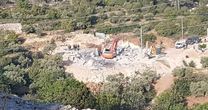
Head of World Health Organization (WHO) in the Palestinian territories, Gerald Rockenschaub, warned of the continuation of the fuel shortage crisis in Gaza hospitals and health facilities, alerting that they will be running out of fuel by the end of February or at maximum during the month of March.
In a press statement following a meeting with Undersecretary of the Ministry of Health in Gaza on Wednesday, Rockenschaub said that the conditions in Gaza hospitals are too difficult. He pointed out that the measures taken by the Ministry are tough but necessary in order to save the lives of people until the crisis is resolved.
He said that his organization is exerting intensive efforts for coming up with a solution to the crisis.
In a press statement following a meeting with Undersecretary of the Ministry of Health in Gaza on Wednesday, Rockenschaub said that the conditions in Gaza hospitals are too difficult. He pointed out that the measures taken by the Ministry are tough but necessary in order to save the lives of people until the crisis is resolved.
He said that his organization is exerting intensive efforts for coming up with a solution to the crisis.

The Gaza-based Palestinian Health Ministry said Wednesday that power generators in seven vital health centers across the Gaza enclave have gone out of operation as a result of fuel dearth.
The ministry’s spokesman Ashraf al-Qidrah said the list of centers affected by the crisis includes the Sourani Center, the Medical Foundation, Gaza’s Health Department, Absan al-Kabira Center, Atatra Centra, and a center for people with disabilities.
Al-Qidrah said that the ministry’s crisis management committee warned that the health situation in the Gaza Strip has gone from bad to worse and that the enclave is going through an alarming phase due to the fuel crisis.
The committee urged donor parties to immediately step in and work out the fuel crisis before it is too late. It also called on the Electricity Distribution Company to find urgent solutions and make every possible effort to provide fuel supplies to Gaza’s hospitals around the clock.
Al-Qidrah added that a number of health facilities have suspended their services at Beit Hanoun Hospital and al-Durra Children's Hospital for the third day running and that all the patients were made to endure urgent inter-hospital transfers as a result of the crisis.
“The power generator at Gaza’s psychiatric hospital is also expected to run out of fuel in the next few hours,” the official further warned.
The ministry’s spokesman Ashraf al-Qidrah said the list of centers affected by the crisis includes the Sourani Center, the Medical Foundation, Gaza’s Health Department, Absan al-Kabira Center, Atatra Centra, and a center for people with disabilities.
Al-Qidrah said that the ministry’s crisis management committee warned that the health situation in the Gaza Strip has gone from bad to worse and that the enclave is going through an alarming phase due to the fuel crisis.
The committee urged donor parties to immediately step in and work out the fuel crisis before it is too late. It also called on the Electricity Distribution Company to find urgent solutions and make every possible effort to provide fuel supplies to Gaza’s hospitals around the clock.
Al-Qidrah added that a number of health facilities have suspended their services at Beit Hanoun Hospital and al-Durra Children's Hospital for the third day running and that all the patients were made to endure urgent inter-hospital transfers as a result of the crisis.
“The power generator at Gaza’s psychiatric hospital is also expected to run out of fuel in the next few hours,” the official further warned.

Israeli settlers on Wednesday uprooted about 100 olive trees in Salfit’s village of Yasuf, in the occupied West Bank.
Ghassan Daghlas, who monitors settlement activities in the northern West Bank, said that Israeli settlers from the illegal Israeli settlement of Rehelim uprooted about 100 olive trees belonging to Mohammad Saleh Jazi, a Palestinian citizen from Yasuf.
Local activists continue to sound alarm bells over the increasing attacks by extremist Israeli settlers against Palestinians and their properties in the occupied West Bank.
Ghassan Daghlas, who monitors settlement activities in the northern West Bank, said that Israeli settlers from the illegal Israeli settlement of Rehelim uprooted about 100 olive trees belonging to Mohammad Saleh Jazi, a Palestinian citizen from Yasuf.
Local activists continue to sound alarm bells over the increasing attacks by extremist Israeli settlers against Palestinians and their properties in the occupied West Bank.
30 jan 2018

UN Middle East peace envoy Nickolay Mladenov on Tuesday warned that the Palestinian coastal enclave of the Gaza Strip is on the verge of full collapse.
“Without the two-state solution Gaza risks exploding again, this time in a far more deadly and violent manner than in the past,” Mladenov said at the annual conference of Israel’s Institute for National Security Studies in Tel Aviv.
“I often say publicly, in UN Security Council briefings and in other formats, that we are in the midst of a major humanitarian crisis,” Mladenov said.
“We’re on the verge of a total systems failure in Gaza, with a full collapse of the economy, with social services, political, humanitarian and security implications stemming from that.”, he added.
“Without the two-state solution Gaza risks exploding again, this time in a far more deadly and violent manner than in the past,” Mladenov said at the annual conference of Israel’s Institute for National Security Studies in Tel Aviv.
“I often say publicly, in UN Security Council briefings and in other formats, that we are in the midst of a major humanitarian crisis,” Mladenov said.
“We’re on the verge of a total systems failure in Gaza, with a full collapse of the economy, with social services, political, humanitarian and security implications stemming from that.”, he added.
